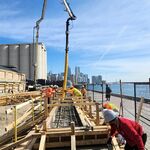afransen
Senior Member
Thought I would extract this discussion from the TRBOT regional rail thread.
The 407 is clearly not busy in the evenings. Tolls could be set lower during off peak times and still allow traffic to be free-flowing. If road tolls could really be or would need to be set as high as the 407 to make a dent in congestion on highways, I would say that presents an opportunity. Typical toll rate is $0.40-0.50/km. If half the kms driven in the city are highway kms, and a driver drives around 20k km per year, that would be $4k-5k per year per person in toll revenue. Say there are 4M drivers in the GTA. That's $20B/year in revenue. I kind of refuse to believe you could not shift any behaviour, particularly if you made off-peak trips quite cheap (provided there is no congestion at that time). One idea would to be to put the tolls in place, take part of the revenues to fund improvements in transit, and the rest as a rebate to residents regardless of transportation behavior, similar to the carbon tax. Call it a transportation dividend. Maybe give every resident 3k km per year in free off-peak highway kms.
I just can't see the case for building new highways if we say they are essentially worthless and the use of which should be sold for 'free'.
Only 1 of these 2 things can be true at once: Either toll highways don't affect how people commute to downtown, which means very few people will stop using the highway and the "benefit" of a free and open highway doesn't exist, or toll highways do push people off them, which include people that may not afford constantly using it. We have an example of a toll highway here in Toronto, its called the 407, and it causes chaos to our highway network. People who
can't afford to use it squeezed on to nearby local streets such as Highway 7 or the 401 (which makes the congestion on that highway even worse), and the only people who regularly use it are those who are in the upper middle class or rich people who have a ton of money, or have a decent enough salary where they're fine with paying the toll.
Now you might say that this is the case for the 407 because its far too expensive, but let me tell you something, if the 407 was any cheaper it would get really congested. If the 407 had a flat fare of like $2, it would reach nearly DVP during off peak hours levels of bad almost instantly, so these people won't have a "free and fast" highway, they would just be stuck paying extra to commute just because (well in the case of the 407 way less, but the subject is other highways).
Tbh, I don't even think you need to be that stringent. I may have not may this explicitly clear, I think I may have been a bit too vague in some of my older posts, but I think I would be okay with general tolls on the central portions of DVP/Gardiner during rush hours explicitly which is when the GO Trains are running, and frequently. While the GO Train doesn't have great coverage from a pedestrian scale, on a car scale its actually pretty good and you could easily access a GO station within 10 minutes of driving from most places in the region (Exceptions exist for like Northern Durham and Northeastern York, but that's what East Gwillimbury and Bloomington GO are for), and when most of the region will have frequent all day GO service through RER, feel free to implement tolls at all times.
The 407 is clearly not busy in the evenings. Tolls could be set lower during off peak times and still allow traffic to be free-flowing. If road tolls could really be or would need to be set as high as the 407 to make a dent in congestion on highways, I would say that presents an opportunity. Typical toll rate is $0.40-0.50/km. If half the kms driven in the city are highway kms, and a driver drives around 20k km per year, that would be $4k-5k per year per person in toll revenue. Say there are 4M drivers in the GTA. That's $20B/year in revenue. I kind of refuse to believe you could not shift any behaviour, particularly if you made off-peak trips quite cheap (provided there is no congestion at that time). One idea would to be to put the tolls in place, take part of the revenues to fund improvements in transit, and the rest as a rebate to residents regardless of transportation behavior, similar to the carbon tax. Call it a transportation dividend. Maybe give every resident 3k km per year in free off-peak highway kms.
I just can't see the case for building new highways if we say they are essentially worthless and the use of which should be sold for 'free'.
Last edited:





